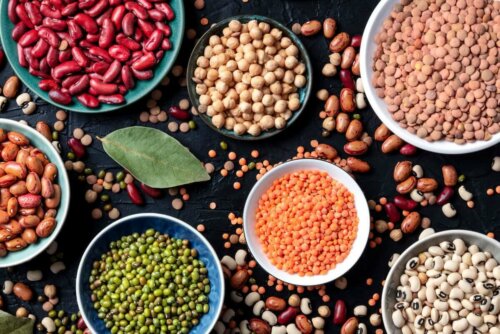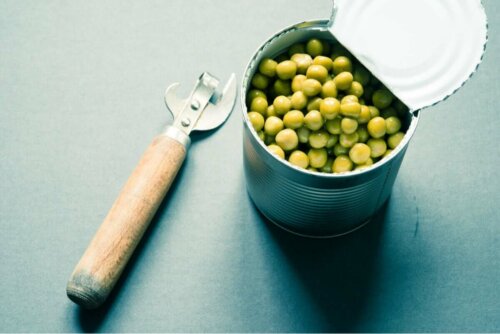Nutritional Information and Health Benefits of Peas


Written and verified by the nutritionist Saúl Sánchez Arias
There are many health benefits of peas.
In fact, it’s a wholesome food that nutritionists advise including in almost any type of diet. The results are evident in the medium term, as long as you consume them as part of a well-balanced diet.
This vegetable belongs to the legume family and so it has many of its characteristics. According to expert opinion, you must eat legumes at least once a week. A higher intake of this type of food is related to a lower risk of developing certain complex conditions, such as cardiovascular diseases.
The nutritional value of peas
There are 31 calories in 100 grams of green beans so it isn’t that energetic. In terms of macronutrients, there are 7 grams of carbohydrates and 1.8 grams of protein for the same amount of product. What this means is they’re practically devoid of lipids.
This legume stands out for its water and fiber content. In fact, this last element gives it several of its health properties.
As far as micronutrients are concerned, the vitamin A (690 milligrams) and vitamin B9 (33 milligrams) contents stand out above the rest. It also has 6 milligrams of sodium and a significant amount of 12.2 milligrams of vitamin C.

Check out these Four Meals You Can Make with a Can of Beans
The health benefits of including peas in your diet
Read on to learn about the health benefits and scientific position on the consumption of peas.
1. Reduced intestinal problems
Fiber consumption is associated with a lower risk of constipation. This is because it improves intestinal transit and ensures frequent, consistent, and effortless bowel movements.
Also, this substance has been proven effective against colon cancer. It increases the size of the fecal bolus and carries away waste products that may remain adhered to the walls of the intestine because the body can’t digest it. Thus, it keeps them from damaging the tissue.
In addition, regular fiber intake increase fills you up so it reduces snacking between meals and makes it easier to adhere to a weight-loss diet.
2. Control of ingested fats
The influence of diet on fat intake is indeed limited. However, some types of food may slightly reduce plasma cholesterol or triglyceride levels. This could be associated with a lower cardiovascular risk.
What’s clear is that fiber partially blocks the absorption of certain nutrients such as dietary fat and cholesterol. At least according to a study published in Postępy Higieny i Medycyny Doświadczalnej. This way, the synthesis of these elements stimulates endogenously, and so the regulation is quite effective.
It also has a similar effect in modulating the absorption of carbohydrates. This is because it delays the entry of carbohydrates into the bloodstream. It can be an effective strategy for diabetes control.
Find out what are the health Benefits of Legumes You Didn’t Know About
3. Improving the immune system
As mentioned above, peas have a significant concentration of vitamin C. This nutrient can improve the functioning of the immune system, according to current scientific evidence.
Scientific claims indicate that ensuring consumption of 1 gram of the substance per day helps prevent the development of certain infectious diseases, such as common colds. Also, it reduces the time of presence of symptoms once there’s a disease.

How to cook peas to reap the most benefits
Cooking this vegetable is actually quite simple. You must cook them before consuming them — keep in mind that the slower the cooking process, the better the final result.
The best way to do so is to place them in a pot along with some sauteed vegetables, add enough water. Then, set the temperature so the liquid reaches the boiling point and let them cook for about an hour or so until they’re soft.
Note that most pea varieties require soaking for at least 24 hours.
The good news is you can find canned peas and these are already cooked. It increases the possibilities and you can use them in salads, bean paste, and even sautéed next to ingredients like bacon.
As you can see, you can experiment until you find your favorite way to cook this legume.
Nutritionists recommend peas due to their health benefits
As explained above, peas are highly recommended by health specialists in the context of a well-balanced diet. This legume contains essential nutrients for the organism and has significant concentrations of fiber.
It also stands out for its versatility at the culinary level, which will allow you to experiment and add it to various dishes. Stews are the most classic option, but their presence in salads and stir-fries will surely surprise you.
It’s OK to buy canned or cooked peas as their nutritional properties remain intact and these facilitate their inclusion in all of your dishes.
All cited sources were thoroughly reviewed by our team to ensure their quality, reliability, currency, and validity. The bibliography of this article was considered reliable and of academic or scientific accuracy.
- Gianfredi V, Salvatori T, Villarini M, Moretti M, Nucci D, Realdon S. Is dietary fibre truly protective against colon cancer? A systematic review and meta-analysis. Int J Food Sci Nutr. 2018 Dec;69(8):904-915.
- Maćkowiak K, Torlińska-Walkowiak N, Torlińska B. Dietary fibre as an important constituent of the diet. Postepy Hig Med Dosw (Online). 2016 Feb 25;70:104-9.
- Carr AC, Maggini S. Vitamin C and Immune Function. Nutrients. 2017 Nov 3;9(11):1211.
This text is provided for informational purposes only and does not replace consultation with a professional. If in doubt, consult your specialist.








